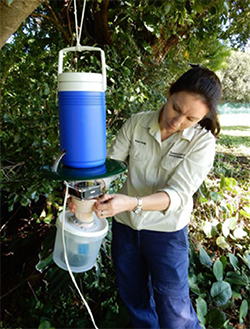Focus on public health

Dr Cassie Jansen is researching mosquito-borne diseases and emerging viruses.
As a leader in their field, the Metro North Public Health Unit (MNPHU) is committed to contributing to evidence-based practice, exploring new technology and ideas, and seeking to understand and reduce risks through better and more efficient ways of working.
The unit actively seeks partners and opportunities for further involvement in relevant research and through publication. The diversity of their clinical work has resulted in a broad range of research interests, all with a focus on improving public health outcomes. These projects have contributed to more than 20 publications in 2016. One such collaboration was as part of a National Health and Medical Research Council funded project into understanding the risk of mosquito-borne chikungunya infection transmission in Australia.
A project with the University of Queensland (UQ) aims to better understand how Cryptosporidium spreads in the community, and develop tools to improve the management of health risks in public aquatic facilities. Preventing this significant gastrointestinal illness remains a public health challenge with a lack of understanding of the epidemiology of cryptosporidiosis, poor adherence and understanding of regulations governing staff and patron behaviour, and low levels of public knowledge and awareness such as how long they should exclude themselves from a public swimming pool after experiencing diarrhoea. This project has a unique multidisciplinary approach to a persistent environmental health issue by blending molecular, epidemiological, biomedical and sociological nethodologies to develop evidence-based solutions.
The team has also collaborated with UQ and Queensland Positive People to trial rapid testing for Chlamydia and Gonorrhoea within an urban setting using a community based, peer-led model of service delivery. This seeks to provide a more comprehensive sexual health service, complementing current point of care testing for HIV and Syphilis.
Through the Queensland Alliance for Environmental Health Sciences, Metro North Public Health Unit and UQ are working on an innovative treatment for opportunistic pathogens in plumbing, such as Legionella. This project aims to lessen the risk of infectious disease from drinking water distribution systems, particularly in places where the problem is exacerbated, such as healthcare facilities. The solution would enable improved managementstrategies and potential cost benefits over existingtreatments employed for control of these pathogens. The three-year study will use various approaches andtechniques to study pipe biofilms and reveal significant findings relating to Legionella ecology which will allow testing of various antimicrobial treatments to control Legionella levels in plumbing.
Other projects include a partnership with 14 Queensland local governments in and Queensland Health Forensic and Scientific Services aiming to collect and analyse mosquito collections for alphavirus activity, and a partnership with the Department of Health on varicella vaccine effectiveness.
